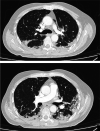COVID-19-associated pneumomediastinum
- PMID: 32628129
- PMCID: PMC7385785
- DOI: 10.7861/clinmed.2020-0247
COVID-19-associated pneumomediastinum
Abstract
A case is presented highlighting the emerging association of COVID-19 with pneumomediastinum, even in patients who have never received mechanical ventilation or positive airway pressure.
Keywords: COVID-19; SARS; pneumomediastinum.
© Royal College of Physicians 2020. All rights reserved.
Figures


References
-
- Caceres M, Ali SZ, Braud R, Weiman D, Garrett HE. Spontaneous pneumomediastinum: a comparative study and review of the literature. Ann Thorac Surg 2008;86:962–6. - PubMed
-
- Chu CM, Leung YY, Hui JYH, et al. Spontaneous pneumomediastinum in patients with severe acute respiratory syndrome. Eur Respir J 2004;23:802–4. - PubMed
-
- World Health Organization Clinical management of severe acute respiratory infection (SARI) when COVID-19 disease is suspected. WHO, 2020. Available from www.who.int/publications-detail/clinical-management-of-severe-acute-resp... [Accessed 10 May 2020].
Publication types
MeSH terms
LinkOut - more resources
Full Text Sources
Miscellaneous

